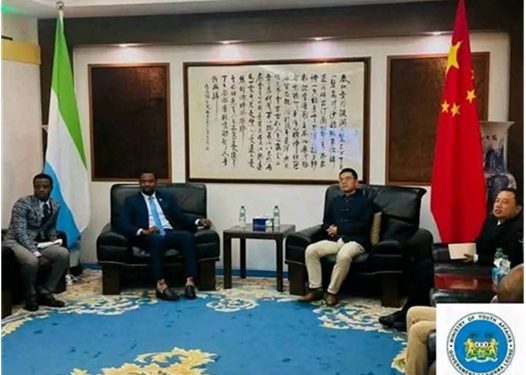By Hassan Osman Kargbo
In a significant move to strengthen bilateral cooperation and create transformative opportunities for young people, Sierra Leone’s Minister of Youth Affairs, Mr Ibrahim Sannoh, presented his strategic vision to His Excellency Wang Qing, the Ambassador of the People’s Republic of Chinese to Sierra Leone, during a high-level meeting at the Chinese Embassy in Freetown.
The engagement focused on unlocking new avenues for youth empowerment and sustainable development, with both parties reaffirming a shared commitment to deepening collaboration. Minister Sannoh outlined a comprehensive roadmap that prioritizes youth involvement in agriculture, entrepreneurship, and local development, positioning young people as key drivers of national progress.
Ambassador Wang Qing expressed strong support for the minister’s strategic plan, describing it as a timely and impactful initiative. He pledged government-level resource mobilization through China Aid to back the programme, adding that the Embassy’s Trade and Economic Office would actively publicize the initiative to attract further international partnerships and investments.
“This vision aligns well with China’s approach to development cooperation,” said Ambassador Wang. “We are committed to supporting Sierra Leone in this journey, especially efforts that empower the youth and build a resilient and inclusive economy.”
At the heart of Minister Sannoh’s strategy is youth-led agricultural transformation, with a particular focus on cash crop production. The plan ensures that each chiefdom in Sierra Leone’s 16 districts will launch three core agricultural ventures: rice cultivation, poultry farming, and a locally relevant cash crop. This initiative aims to strengthen food security, create employment, and encourage rural entrepreneurship driven by young people.
Minister Sannoh emphasized the potential of agriculture not only as a solution to youth unemployment but also as a tool for national self-reliance and community development.
“Our youth must be at the centre of Sierra Leone’s development,” he stated. “By equipping them with the resources, skills, and opportunities to succeed in agriculture and related sectors, we are investing in a more prosperous and self-sufficient future.”
The meeting also explored other areas of mutual interest, including technical and vocational education, innovation, and small enterprise development. China’s experience in these sectors was highlighted as a valuable asset that Sierra Leone could tap into through continued knowledge exchange and targeted investment.
The collaboration builds on a longstanding partnership between Sierra Leone and China, which has seen joint initiatives across infrastructure, health, education, and technology. With this renewed focus on youth development, both governments signal a shift toward people-centred growth and sustainability.
Observers have welcomed the move, noting that the strategy has the potential to transform rural economies and reduce dependency on urban job markets. By anchoring the programme in every chiefdom, the approach ensures geographic inclusivity and national reach.
As global attention increasingly turns to youth-driven development and agricultural innovation, Sierra Leone’s partnership with China could serve as a model for other developing nations aiming to harness their demographic dividend.
“This is more than just a bilateral agreement,” Minister Sannoh concluded. “It’s a commitment to our youth, our future, and to building a nation where no young person is left behind.”
With China reaffirming its role as a steadfast development partner, the future for Sierra Leone’s youth looks brighter than ever.












